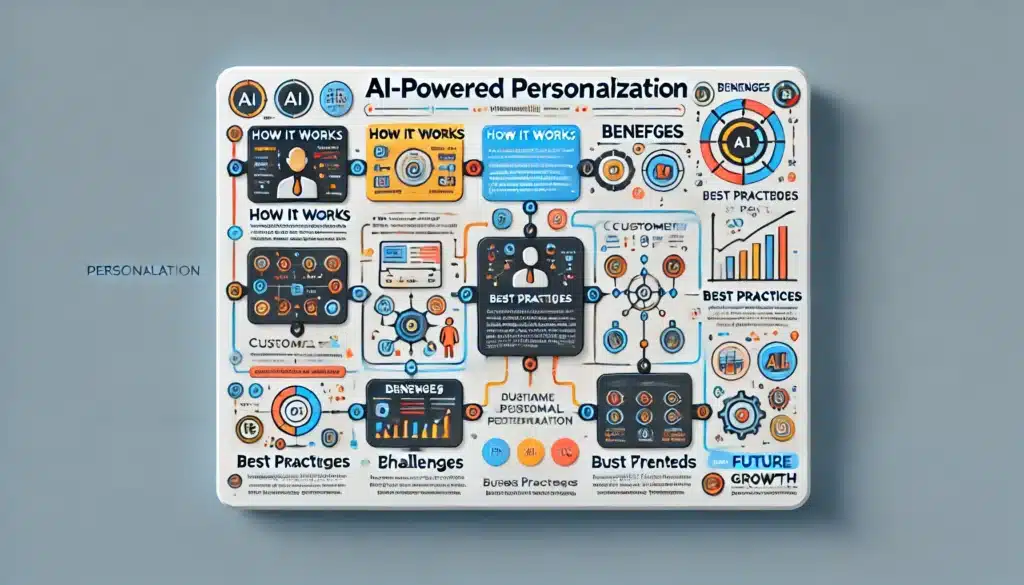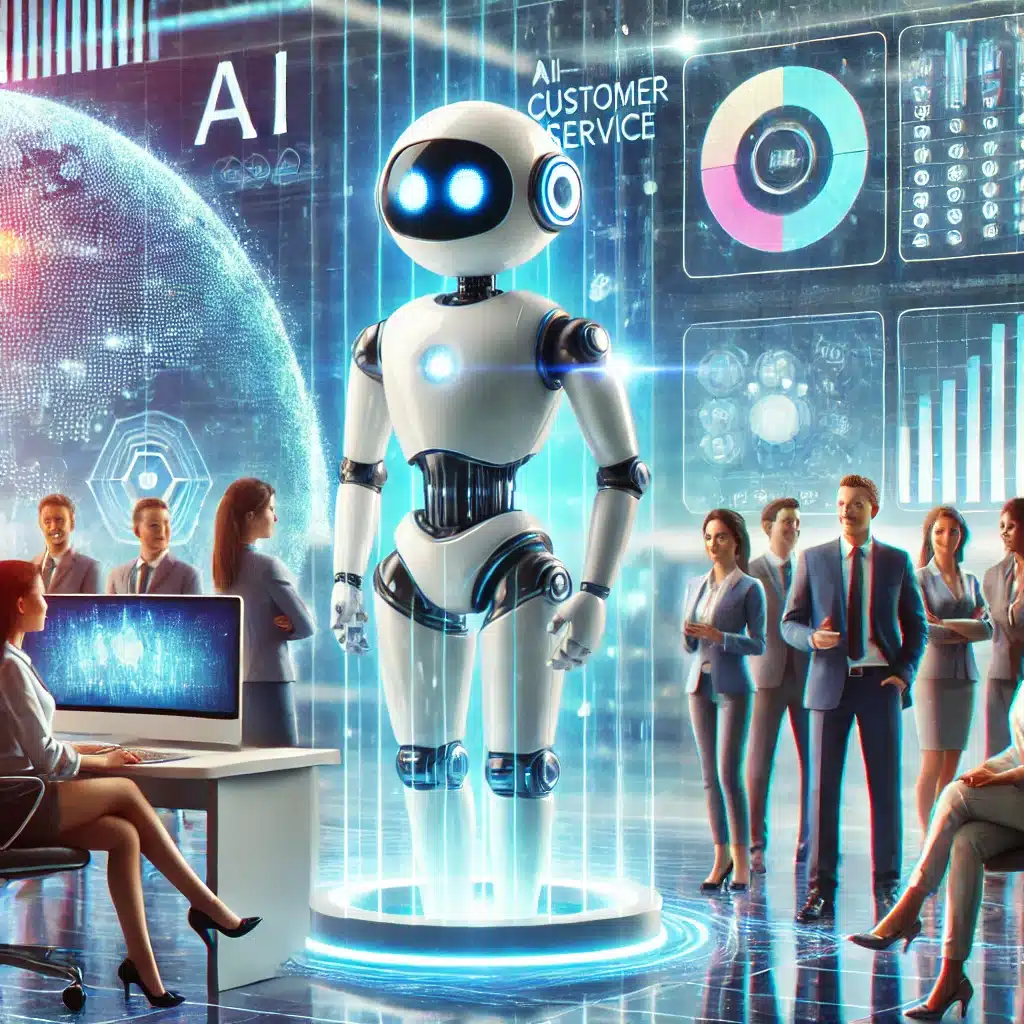In the fast-paced digital landscape, customers are demanding personalization to meet their needs and preferences. Businesses cannot keep up with the demand, and AI-powered personalization is emerging as a revolutionary solution to the challenge of competition. By artificial intelligence, companies can analyze customer data, predict behavior, and adapt their interactions to create truly individualized experiences. This approach ensures that every customer journey feels uniquely customized, driving satisfaction, engagement, and loyalty.
Understanding AI-Powered Personalization
At its core, AI-driven personalization relies on advanced algorithms and data analysis to let an entity understand and predict the preferences of a customer. AI can pattern the customer’s behavior with real-time processing of billions of data; besides such behavior, browsing history, purchase, and interaction preferences are available for a business to send a customized experience bespoke product recommendations to bespoke marketing messages.
How does AI-powered personalization work?
It captures customer data coming from varied sources like sites, mobile apps, and social media as well as previous purchases.
- Data Analysis: The machine learning algorithms analyze data to identify patterns and trends that point to customer preference and behavior.
- Predictive modeling: AI tries to predict what the customers may be interested in or may need after studying upon data.
- Content personalization: AI provides relevant content, products, and offers in real-time.
Key Features of AI-Powered Personalization
- Behavioral Insights: Deep analysis to gain insight into customer preference.
- Cross-Channel Integration: Seamless personalization on web, mobile, and email.
- Dynamic Adjustments: Fast response to customers’ changing needs and contexts.
Example Use Cases
- E-Commerce: As soon as a customer visits an e-commerce site, AI will analyze his browsing history and purchase history, suggesting products based on his interest.
- Email Marketing: AI curates campaigns in email marketing according to individual recipients’ tastes so that people receive more open and click-through rates in emails sent.
- Streaming Services: Netflix and Spotify use AI to recommend shows, movies, and music based on user preferences and past interactions.
Real-Time Adaptation
One of the key advantages of AI-powered personalization is its ability to adapt in real time. Traditional personalization strategies often rely on static data, which may not reflect a customer’s current preferences or needs. AI, on the other hand, continuously updates its understanding of each customer as new data becomes available. This real-time adaptation ensures that the content and offers presented to customers are always relevant, enhancing their overall experience.
For instance, if a customer starts browsing for vacation packages after months of purchasing only work-related items, AI can immediately adjust its recommendations to focus on travel-related products and services. This dynamic adjustment keeps the customer journey personalized and responsive to changing needs.
Benefits of AI-Powered Personalization
- Improved Customer Satisfaction: By delivering relevant and timely content, AI-powered personalization enhances the customer experience, leading to higher satisfaction and loyalty.
- Increased Conversion Rates: Personalized recommendations and offers are more likely to resonate with customers, resulting in higher conversion rates and increased sales.
- Efficient Marketing Spend: By targeting customers with personalized content, businesses can optimize their marketing efforts, reducing waste and increasing return on investment.
- Deeper Customer Insights: AI provides businesses with valuable insights into customer behavior, preferences, and trends, enabling more informed decision-making.
Challenges and Considerations
1. Data privacy concerns
Extensive data collection is required for effective AI-powered personalization, which raises privacy issues. Customers may not be comfortable if they feel that businesses are intrusive.
How to Solve Privacy Issues:
- Be open about using data.
- Obey laws such as GDPR and CCPA.
- Give customers control over their data, for instance, to opt in or opt out.
2. Over-personalization
Great concept in personalization, but at the cost of overcustomization getting sometimes into people’s personal lives, like for example, recommendations getting too personal.
Striking the Right Balance:
- Concentrate on providing the value, not the quantum of data collected.
- Use personalization subtly to maintain a customer’s trust.
3. Implementation Costs
It is very resource-intensive in terms of technology, human personnel, and infrastructure to adopt AI-driven personalization.
Solution:
Start small, scalable AI solutions and grow when ROI improves.
Best practices for AI-powered personalization
1. Segment your audience
Use AI to segment your audience based on common characteristics, demographics, interests, or buy behavior, so personalization can be more targeted.
2. Concentrate on high-value touchpoints
Identify the touch points at which personalization can really create that difference, such as on product recommendation, check-out, and even after sale.
3. Test and Refine
Continue testing personalization strategies to see what works for your business. A/B test to refine and maximize.
4. Ethical use of data
Always observe the means of ethical data collection and utilization of customers. One develops confidence through transparency and with customers’ consent.
5. Investment in scalable AI solutions
Select AI tools and platforms that will scale with your business. Scalable solutions make it possible to adapt to higher customer demands and greater volumes of data.

Future Trends in AI-based Personalization.
1. Over-personalization
With advances in AI technology, businesses will be able to deliver much more granular personalization that would account for mood, context, and location.
2. Voice and conversational AI
Voice assistants and chatbots are also an integral part of personalization. AI-driven conversational tools provide real-time support to the individual’s requirements.
3. AR and VR Integration
With these tools, the combination of AR and virtual reality with AI can give an immersive, user-driven experience – for example, virtual try-ons and tailored virtual tours.
4. AI-Powered Loyalty Programs
AI will predict customer needs and rewards to further enhance loyalty programs that will help increase engagement and retention.
Industry-Specific Applications
- Wholesale
Retailers use AI to personalize shopping, and product recommendations, and optimize inventory management according to customer trends.
- Medicine
AI-powered personalization would help healthcare providers personalize treatment plans, predict patients’ needs, and have more engagement with the patients through personalized communication.
- Education
EdTech platforms make use of AI to personalize learning experiences using the performance, preferences, and goals of students.
- Travel and Hospitality
AI makes traveling easy with customized travel plans, live updates about traveling, and personalized hotel recommendations.
Conclusion
AI-powered personalization is transforming the customer journey by delivering tailored experiences in real time. By leveraging Artificial Intelligence, businesses can enhance customer satisfaction, increase conversion rates, and gain valuable insights into customer behavior. However, it’s essential to address the challenges of data privacy and avoid over-personalization to maintain trust. As AI technology continues to evolve, its role in personalization will only grow, helping businesses create more meaningful and engaging customer experiences.
FAQs
1. How does AI-powered personalization benefit customer experience?
AI-powered personalization enhances customer experience in terms of delivering relevant, timely, and customized content that makes customers feel appreciated and understood.
2. What data will AI personalization consume?
AI personalization will consume the browsing history, purchase history, preference for interaction, and demographics to craft experiences.
3. Will AI-powered personalization benefit small businesses?
Absolutely, small businesses can take advantage of the cost-effective and scalable solutions with AI to deliver personalized experiences, enhance customer engagement, and increase ROI.
4. How can businesses overcome data privacy concerns in AI-powered personalization?
Businesses should be transparent about the usage of data, comply with privacy regulations, and give customers control over their data.
5. Among industries, what will benefit the most from AI personalization?
E-commerce, entertainment, healthcare, finance, etc; because basically, any industry which is interested in the experience of a customer may employ such technology.



